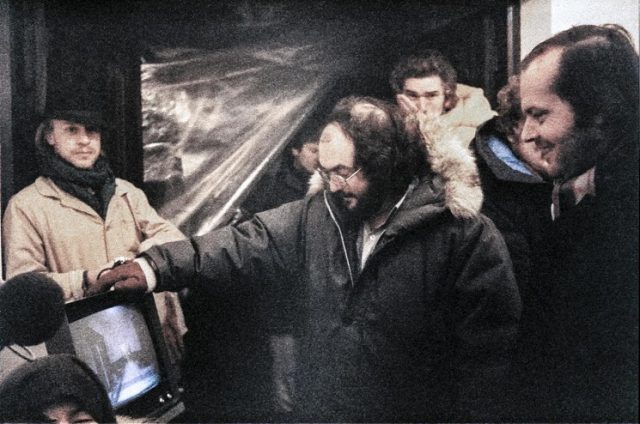
Leon Vitali, Stanley Kubrick, and Jack Nicholson on the set of The Shining, as seen in documentary Filmworker
Metrograph
7 Ludlow St. between Canal & Hester Sts.
May 11-27
212-660-0312
metrograph.com
In conjunction with the release of Tony Zierra’s Filmworker, a vastly entertaining documentary about Leon Vitali, an actor who gave up his career in order to be Stanley Kubrick’s right-hand man and jack-of-all-trades for many years, Metrograph is presenting “Stanley Kubrick x 8,” consisting of eight of the Bronx-born ex-pat’s classic films. The series includes Barry Lyndon, The Shining, and Full Metal Jacket, which are featured extensively in Filmworker, in addition to Lolita, A Clockwork Orange, The Killing, Paths of Glory, and Dr. Strangelove.
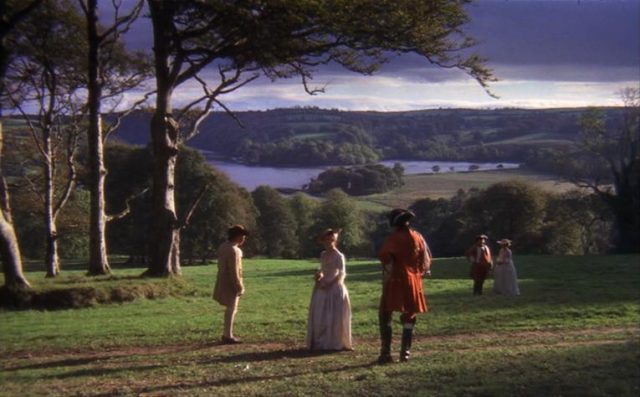
The sumptuous Barry Lyndon is a treat for the eyes and ears
BARRY LYNDON (Stanley Kubrick, 1975)
Saturday, May 12, 3:30 & 9:30
Friday, May 25, 6:30
metrograph.com
 Stanley Kubrick’s lush, romantic epic, Barry Lyndon, is one of the most elegantly visual pictures ever made. Based on William Makepeace Thackeray’s 1844 serialized picaresque novel The Luck of Barry Lyndon, Kubrick’s extravagant three-hour tale follows the shenanigans of one Redmond Barry, played with endless charm by Ryan O’Neal. The man soon to be known as Barry Lyndon has a remarkable knack for survival — or maybe it’s just plain old Irish luck — as he rises in English society via a series of duels (with epees, guns, and bare knuckles), military battles (the Seven Years’ War), and, most prominently, sexual conquests. Consisting of two sections, “By What Means Redmond Barry Acquired the Style and Title of Barry Lyndon” and “Containing an Account of the Misfortunes and Disasters Which Befell Barry Lyndon,” the film features glorious music by Bach, Vivaldi, Handel, Mozart, Schubert, and the Chieftains in addition to absolutely divine locations that lay the groundwork for the sumptuous Oscar-winning art direction by Ken Adam, Vernon Dixon, and Roy Walker and cinematography by John Alcott; virtually every scene contains beautiful shots based on famous paintings, a treat for the eyes and the ears. (Leonard Rosenman took home an Academy Award as well for his adapted score.) The overly long story does drag at times, but it flows better once you get used to O’Neal in the title role. The underappreciated film also has a great supporting cast, with Marisa Berenson as Lady Lyndon, Patrick Magee as the Chevalier de Balibari, Hardy Krüger as Captain Potzdorf, Steven Berkoff as Lord Ludd, Leonard Rossiter as Captain John Quin, Gay Hamilton as Nora Brady, and Leon Vitali as Lord Bullingdon.
Stanley Kubrick’s lush, romantic epic, Barry Lyndon, is one of the most elegantly visual pictures ever made. Based on William Makepeace Thackeray’s 1844 serialized picaresque novel The Luck of Barry Lyndon, Kubrick’s extravagant three-hour tale follows the shenanigans of one Redmond Barry, played with endless charm by Ryan O’Neal. The man soon to be known as Barry Lyndon has a remarkable knack for survival — or maybe it’s just plain old Irish luck — as he rises in English society via a series of duels (with epees, guns, and bare knuckles), military battles (the Seven Years’ War), and, most prominently, sexual conquests. Consisting of two sections, “By What Means Redmond Barry Acquired the Style and Title of Barry Lyndon” and “Containing an Account of the Misfortunes and Disasters Which Befell Barry Lyndon,” the film features glorious music by Bach, Vivaldi, Handel, Mozart, Schubert, and the Chieftains in addition to absolutely divine locations that lay the groundwork for the sumptuous Oscar-winning art direction by Ken Adam, Vernon Dixon, and Roy Walker and cinematography by John Alcott; virtually every scene contains beautiful shots based on famous paintings, a treat for the eyes and the ears. (Leonard Rosenman took home an Academy Award as well for his adapted score.) The overly long story does drag at times, but it flows better once you get used to O’Neal in the title role. The underappreciated film also has a great supporting cast, with Marisa Berenson as Lady Lyndon, Patrick Magee as the Chevalier de Balibari, Hardy Krüger as Captain Potzdorf, Steven Berkoff as Lord Ludd, Leonard Rossiter as Captain John Quin, Gay Hamilton as Nora Brady, and Leon Vitali as Lord Bullingdon.
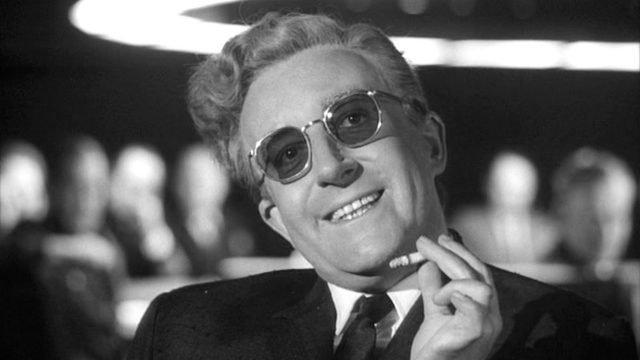
Peter Sellers has some grand plans for the end of the world as Dr. Strangelove in classic Kubrick cold war comedy
DR. STRANGELOVE, OR HOW I STOPPED WORRYING AND LEARNED TO LOVE THE BOMB (Stanley Kubrick, 1964)
Sunday, May 13, 3:30 & 7:45
Wednesday, May 16, 3:00
Friday, May 18, 7:00
metrograph.com
 Stanley Kubrick’s Dr. Strangelove, or How I Stopped Worrying and Learned to Love the Bomb is one of the grandest satires ever made, the blackest of black comedies. With the threat of nuclear annihilation looming over the United States and the Soviet Union, General Jack D. Ripper (Sterling Hayden) has a meltdown, becoming obsessed with protecting the country’s “precious bodily fluids” and threatening to launch the bombs. While President Merkin Muffley (Peter Sellers) tries to make nice with the Soviets, General Buck Turgidson (George C. Scott) gets caught up in all the military excitement, Colonel Bat Guano (Keenan Wynn) defends the Coca-Cola Company, Group Captain Lionel Mandrake (Sellers) can’t get anyone to listen to him, and Major T. J. “King” Kong (Slim Pickens) prepares for the ride of his life. Based on Peter George’s novel Red Alert and written by George, Kubrick, and Terry Southern, Dr. Strangelove is hysterically funny and wickedly prescient, an absolute hoot from start to finish, featuring razor-sharp dialogue, inspired slapstick, and just enough truth to scare the hell out of you. (Be sure to watch for Peter Bull not being able to stop laughing as Sellers goes crazy in a wheelchair at the end.)
Stanley Kubrick’s Dr. Strangelove, or How I Stopped Worrying and Learned to Love the Bomb is one of the grandest satires ever made, the blackest of black comedies. With the threat of nuclear annihilation looming over the United States and the Soviet Union, General Jack D. Ripper (Sterling Hayden) has a meltdown, becoming obsessed with protecting the country’s “precious bodily fluids” and threatening to launch the bombs. While President Merkin Muffley (Peter Sellers) tries to make nice with the Soviets, General Buck Turgidson (George C. Scott) gets caught up in all the military excitement, Colonel Bat Guano (Keenan Wynn) defends the Coca-Cola Company, Group Captain Lionel Mandrake (Sellers) can’t get anyone to listen to him, and Major T. J. “King” Kong (Slim Pickens) prepares for the ride of his life. Based on Peter George’s novel Red Alert and written by George, Kubrick, and Terry Southern, Dr. Strangelove is hysterically funny and wickedly prescient, an absolute hoot from start to finish, featuring razor-sharp dialogue, inspired slapstick, and just enough truth to scare the hell out of you. (Be sure to watch for Peter Bull not being able to stop laughing as Sellers goes crazy in a wheelchair at the end.)
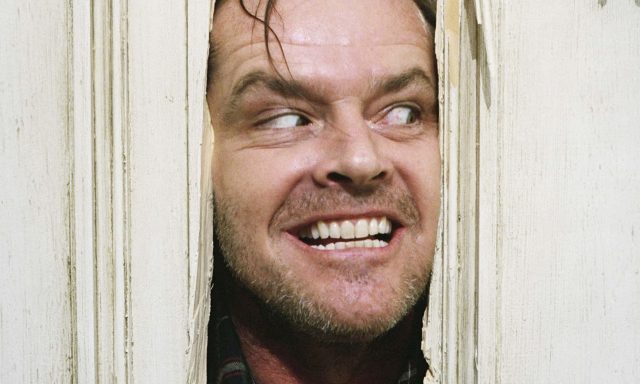
All work and no play makes Jack Nicholson far from a dull boy in The Shining
THE SHINING (Stanley Kubrick, 1980)
Sunday, May 13, 9:45
Thursday, May 17, 4:00 & 6:45
metrograph.com
 All work and no play makes Jack a not-so-quite dull boy in Stanley Kubrick’s classic horror story, based on the Stephen King novel. One of the all-time-great frightfests, The Shining is a truly scary movie about a writer named Jack Torrance (Jack Nicholson at his overacting best) who has agreed to become the caretaker of the old Overlook Hotel in Colorado during the snowy winter when the enormous mountain resort closes down for the season. He is joined by his perpetually nervous wife, Wendy (Shelley Duvall), and their young son, Danny (Danny Lloyd), who seems to have brought along his invisible friend, Tony, who speaks through Danny’s finger. Between taking care of the Overlook and working on his novel, Jack finds a whole bunch of other folks to hang out with, people who have populated the place during the ritzy establishment’s golden age, including a strange woman in room 237. Kubrick plays with horror conventions as he seeks to scare the crap out of the audience, something he accomplishes time and time again as Jack grows more disturbed, Wendy’s shrieks become more and more ear piercing and annoying, and Danny’s visions get more and more bloody. No matter how many times you’ve seen it, it still gets you, even when you know exactly what’s lurking around that corner. Only those who went to the film during its opening weekend, as we did, got to see the two-minute finale that Kubrick cut out immediately thereafter, which involved the iconoclastic director riding his bicycle to various theaters, armed with a pair of scissors.
All work and no play makes Jack a not-so-quite dull boy in Stanley Kubrick’s classic horror story, based on the Stephen King novel. One of the all-time-great frightfests, The Shining is a truly scary movie about a writer named Jack Torrance (Jack Nicholson at his overacting best) who has agreed to become the caretaker of the old Overlook Hotel in Colorado during the snowy winter when the enormous mountain resort closes down for the season. He is joined by his perpetually nervous wife, Wendy (Shelley Duvall), and their young son, Danny (Danny Lloyd), who seems to have brought along his invisible friend, Tony, who speaks through Danny’s finger. Between taking care of the Overlook and working on his novel, Jack finds a whole bunch of other folks to hang out with, people who have populated the place during the ritzy establishment’s golden age, including a strange woman in room 237. Kubrick plays with horror conventions as he seeks to scare the crap out of the audience, something he accomplishes time and time again as Jack grows more disturbed, Wendy’s shrieks become more and more ear piercing and annoying, and Danny’s visions get more and more bloody. No matter how many times you’ve seen it, it still gets you, even when you know exactly what’s lurking around that corner. Only those who went to the film during its opening weekend, as we did, got to see the two-minute finale that Kubrick cut out immediately thereafter, which involved the iconoclastic director riding his bicycle to various theaters, armed with a pair of scissors.
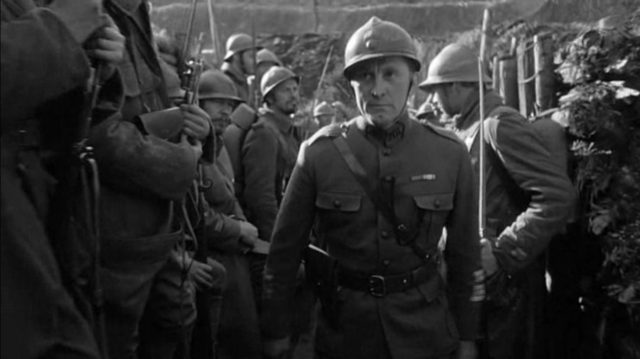
Kirk Douglas discovers that war is indeed hell in Paths of Glory
PATHS OF GLORY (Stanley Kubrick, 1957)
Friday, May 18, 4:30
Saturday, May 19, 6:30 & 10:15
Monday, May 21, 7:35
metrograph.com
 Stanley Kubrick’s harrowing Paths of Glory, based on the novel by Humphrey Cobb, is quite simply the best English-language antiwar film ever made, one of the most emotional, powerful stories ever put on celluloid. Kirk Douglas stars as Colonel Dax, a French military man who disagrees with his superiors’ insistence on sending his men into certain annihilation in order to take a worthless hill during World War I. Dax’s verbal battles with Generals Broulard (Adolphe Menjou) and Mireau (George Macready) are unforgettable, as are the final scenes, in which three random men are chosen to pay the price for what the generals call cowardice. Filmed in stunning black and white, Paths of Glory puts you right on the front lines of the folly of war. Kubrick, who wrote the unrelenting script with Calder Willingham and Jim Thompson, also made the best film about the cold war (Dr. Strangelove, or How I Learned to Stop Worrying and Love the Bomb), the Roman slave revolt (Spartacus), and, arguably, the Vietnam War (Full Metal Jacket).
Stanley Kubrick’s harrowing Paths of Glory, based on the novel by Humphrey Cobb, is quite simply the best English-language antiwar film ever made, one of the most emotional, powerful stories ever put on celluloid. Kirk Douglas stars as Colonel Dax, a French military man who disagrees with his superiors’ insistence on sending his men into certain annihilation in order to take a worthless hill during World War I. Dax’s verbal battles with Generals Broulard (Adolphe Menjou) and Mireau (George Macready) are unforgettable, as are the final scenes, in which three random men are chosen to pay the price for what the generals call cowardice. Filmed in stunning black and white, Paths of Glory puts you right on the front lines of the folly of war. Kubrick, who wrote the unrelenting script with Calder Willingham and Jim Thompson, also made the best film about the cold war (Dr. Strangelove, or How I Learned to Stop Worrying and Love the Bomb), the Roman slave revolt (Spartacus), and, arguably, the Vietnam War (Full Metal Jacket).